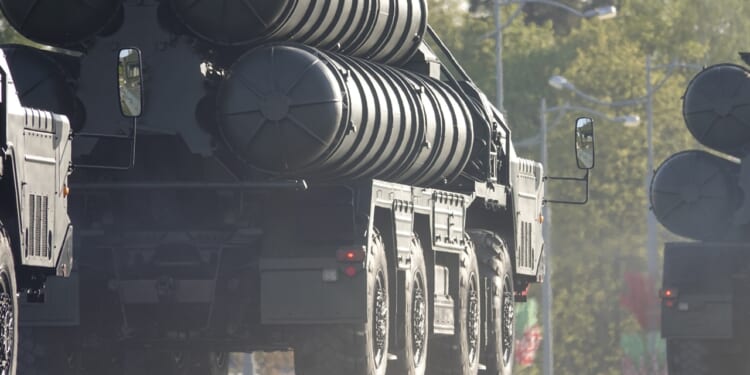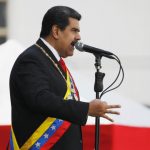As it flounders in Ukraine, Russia has sought to build up its broader alliances—creating a loose axis of anti-Western nations around the world.
In his State of the Union address in 2002, then President George W. Bush coined the term “Axis of Evil,” which he said at the time consisted of Iraq, Iran, and North Korea. That phraseology helped to build support for the invasion of Iraq the following year, knocking Iraq out of the “Axis”—though creating many other problems for the United States over the ensuing decade-long war.
However, Iran and North Korea have remained unreformed since Bush’s speech—and have sought close ties with Russia as well following its fallout with the West, making the notion of an “Axis of Evil” far more concrete than in Bush’s day.
The Axis of Autocratic States
Russia could now be described as a central player in an axis of autocratic states that includes China, Iran, North Korea, and Venezuela. China has opted to remain at least a semblance of neutrality, but the same isn’t true of the other nations that are now deep within Russia’s orbit.
Relations between Moscow and Tehran have deepened significantly since 2022 due mainly to a shared opposition to the West. North Korea has become Russia’s strongest wartime ally, with Pyongyang supplying millions of rounds of artillery shells and even thousands of troops to support the ongoing conflict in Ukraine.
Vladimir Putin, who once described the dissolution of the Soviet Union as a “geopolitical catastrophe,” almost certainly knows that the restoration of the Warsaw Pact and Russia’s influence in Eastern Europe remains an impossibility—even if Hungary and Slovakia have taken a more pro-Russian stance in recent years.
Instead, Russia is looking to counter the West by supporting nations like North Korea, Iran, and, more recently, Venezuela.
Russia Is Supplying Missiles to Maduro
The United States continues to build up its presence in the Caribbean, which now includes the deployment of the nuclear-powered aircraft carrier USS Gerald R. Ford (CVN-78), to counter Venezuela and officially to wage war on the South American drug cartels. It is also part of the effort to oust strongman President Nicolás Maduro from power.
What the Trump administration might not have expected is that the Kremlin may be as determined to support Maduro’s regime as the West has been in its efforts to aid Ukraine.
Earlier this month, a high-ranking Russian lawmaker said that Moscow could further aid Maduro, whose military has relied on Russian support in recent years.
“Russian Pantsir-S1 and Buk-M2E systems were just recently delivered to Caracas by Il-76 transport aircraft,” Alexei Zhuravlev, First Deputy Chairman of the State Duma Defense Committee, told the Russian state-run Gazeta.Ru earlier this week.
As previously reported, there has been speculation that Russian private military contractors (PMC), aka mercenaries from the notorious Wagner Group, had been on a Russian Illyushin Il-76 transport aircraft that landed in Venezuela in late October. The aircraft, which can carry up to 200 people or 50 tons of cargo, made a two-day flight with numerous stops, including in Armenia, Algeria, Morocco, Senegal, and Mauritania.
It remains unclear what else might have been on the transport plane, but Russia has acknowledged it has supplied Caracas with the S-300VM “Antey-2500” (NATO reporting name “SA-23 Gladiator/Giant”) air defense system.
“Russia is actually one of Venezuela’s key military-technical partners; we supply the country with virtually the entire range of weapons, from small arms to aircraft,” added Zhuravlev. “Russian Su-30MK2 fighters are the backbone of the Venezuelan Air Force, making it one of the most powerful air powers in the region. The delivery of several S-300VM battalions has significantly strengthened the country’s ability to protect important installations from air attacks.”
Moscow has suggested it would be open to further supplying Caracas with hypersonic weapons, which could be a significant escalation given the threat such missiles could pose to the United States Navy’s warships, including CVN-78.
“On behalf of President Nicolas Maduro, the Bolivarian government thanks the sister nation of Russia for its continued efforts to condemn and de-escalate military threats in the Caribbean Sea, which directly target Venezuela,” said Venezuela’s Foreign Minister Yvan Gil Pinto in a post on the Telegram social messaging app earlier this week, referring to the government by its official name, the Bolivarian Republic of Venezuela.
Putin Is Also Passing Submarine Tech to North Korea
Last year, Moscow and Pyongyang formed a strategic partnership, after which North Korea provided troops and materiel support to Russia. In turn, Russia is aiding North Korea’s naval build-up. That has included two 5,000-ton destroyers, as well as a nuclear-powered guided-missile submarine.
“The transfer of this technology would not be unexpected and is logically a major part of the exchange that has North Korean troops dying on the front lines of Russia’s war with Ukraine,” wrote noted naval analyst HI Sutton, who added it wouldn’t be the first time North Korea has “received a boost from Russia.”
The Kremlin is believed to have supplied multiple nuclear submarine modules, including a reactor. That could give North Korea a submarine capable of having unlimited endurance and range, one that could carry and launch its new Hwasong-20 intercontinental ballistic missile, which was presented at last month’s military parade in Pyongyang, marking the 80th anniversary of the establishment of the Workers’ Party of Korea.
That may prompt South Korea and other nations in the region to take a similar course of action, further highlighting that we’re close to (or already well in) a Cold War 2.0.
This time, it isn’t so much East vs. West, but Russia and its axis against the world’s democracies.
About the Author: Peter Suciu
Peter Suciu has contributed over 3,200 published pieces to more than four dozen magazines and websites over a 30-year career in journalism. He regularly writes about military hardware, firearms history, cybersecurity, politics, and international affairs. Peter is also a contributing writer for Forbes and Clearance Jobs. He is based in Michigan. You can follow him on Twitter: @PeterSuciu. You can email the author: [email protected].
Image: Shutterstock / VideoFromEveryWhere.

















